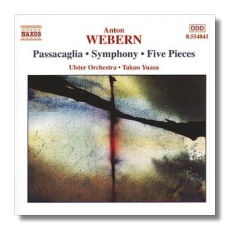
The Internet's Premier Classical Music Source
Related Links
- Webern Reviews
- Latest Reviews
- More Reviews
-
By Composer
-
Collections
DVD & Blu-ray
Books
Concert Reviews
Articles/Interviews
Software
Audio
Search Amazon
Recommended Links
Site News
 CD Review
CD Review
Anton Webern

Orchestral Music
- Passacaglia, Op. 1 (1929)
- Five Movements for Strings, Op. 5 (1929)
- Six Pieces Op. 6 (1909, rev. 1929)
- Five Pieces Op. 10 (1911-13)
- Symphony Op. 21 (1928)
- Variations Op. 30 (1940)
Ulster Orchestra/Takuo Yuasa
Naxos 8.554841
Webern is a tough nut to crack. His music is spare, dark, and difficult to bring off as I learned. Comparison is a wonderful way to learn. If you have only one recording of a piece you have only an instance, not the concept. For this study I worked with Giuseppe Sinopoli's recording of almost the same works on Teldec.
I have decided to focus on the Symphony and Passacaglia since they reflect the same qualities of comparison as all the other works herein. First I pulled out Sinopoli. Since his is the bigger name and orchestra I expected that recording to be better. As I listened to the symphony I noted that it was intriguing and reminded me of the Twilight Zone. Still, the music seemed too cerebral, not emotional. I thought that perhaps I was not ready to appreciate it. I have heard the Passacaglia in a live performance with Stokowski and was blown away. With Sinopoli I came away with the same feeling of detachment from the music. It was interesting in a distant-sort-of-way.
Then I pulled out the Naxos recording expecting the same. I was wrong, wrong, wrong. Here was the emotion missing from Sinopoli's recording. The strings have an aching quality to them, poignancy. They weep. They sigh. The recording is better, too. I hear inner solos masked in the Teldec recording. In short, Webern's music finally came alive to me. He is no longer a cerebral philosopher; he is more a Martinů without a sense of humor. He is dark as Bartók but lacks the folk song way. Webern's is the music of a universe that is not particularly friendly to our existence. Now, you can see the kind of things I was writing when reviewing this Naxos release. It is almost like recordings of different music and while that can be to the advantage of both, it ain't here.
Trying to find the words to describe Webern's music has been a difficult experience. His music strikes a chord in me that is very troubling. I doubt that feeling will ever leave me. Even after having Yuasa's interpretation move me really deeply, it is all too disturbing.
As it happens, I am reading a book by Jacques Barzun that touches on the relationship between words and music. It is obvious that musical notes do not "mean" as do words. What note denotes "snow"? On the other hand, Tchaikovsky named his first symphony "Winter Daydreams". It is not only possible but necessary to talk about music in non-musical terms if we are to discuss our experiences. Thus when I talk about Webern's music being cerebral or eerie those words carry musical connections with them. When I try to find a more specific extra-musical reference, however, words do fail me. I made an effort to see what other scholars might have to say to help me however they, too, have no extra-musical references. Instead they talk about mathematical and, again, what could best be described as cerebral attempts at creating music. While this is fine for discussions with other musicians, it is not even like philosophers talking with one another since they at least attempt to connect what they are talking about with everyday life. That is, Webern's music seems to be music for music's sake not for communicating any kind of feeling with anyone else. I suppose this is one reason I find the music disturbing, but at least this Naxos release does evoke feeling and whether Webern intended that is another matter altogether.
After writing the above I came across a review of Webern's music in American Record Guide (November/December 2001) by David Moore that adds to my listening observations. "Listening to Anton von Webern is an odd trip from late romanticism into uncompromising atonality – unsettling and emotionally a dead end." It also occurs to me that living in the post WWI and then Nazi Germany might have contributed to the composer's retreat into such non-communication but then again maybe not.
So, I recommend this release for its superior insights to the music of Webern, but I cannot say that I recommend the music… maybe at a future time.
Post Script: After writing this I came across a review of the same disc in Fanfare (July/August 2002) by Art Lange. He also recommended this release referring to it, to paraphrase, as "listener friendly".
Copyright © 2002, Robert Stumpf II


















